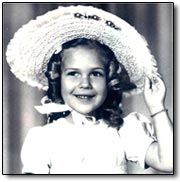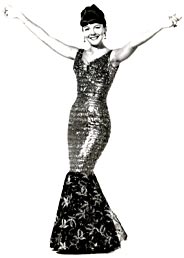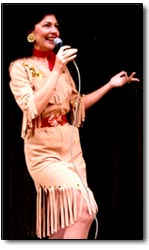

























Born in Gatton, Queensland, Gay Kayler's public appearances began as a little girl, singing to passengers on buses and trams in Sydney. From there, Gay got to know her business backwards, upwards, downwards, sideways or any other which-way you care to look at it–until she became one of the most competent performers in Australian showbusiness. The longevity of her career is the direct result of accumulated knowledge, gained through the help of extraordinarily talented people. In an industry that can be uncomfortably hard and fickle, where musical tastes can change in the blink of an eye, those who refuse to change (or can't change) are left behind on a scrap heap of broken dreams.
And not once in nearly fifty years of 'treading the boards' did Gay Kayler have to contend with a heckler. Her grace and charm on stage inhibited any person acting in any way towards her other than to show the utmost courtesy and respect for her talent.
A very astute entertainment manager said 'Gay Kayler has one of the best gimmicks in showbusiness–she sings in tune!' Sound judgement!
Matthew (Gay)
 A Royal Command Performance
A Royal Command PerformanceHaving passed her Seventh Grade Piano, Theory and Musical Perception, Gay Kayler's professional career began when her family moved from Sydney to Toowoomba, Queensland. An article by Neil Wiseman in the Sunday Mail (Qld) on 15 January 2012 stated, 'Princess Alexandra, a cousin of Queen Elizabeth, came to Queensland in 1959 as part of the state's centenary celebrations ... On that Australian visit she had a song written for her, The Alexandra Waltz, performed by Gatton-born country singer Gay Kayler' at the Centenary Royal Ball. The Fairy Princess (as Alexandra was sometimes known) extended her schedule and by Royal Command, Gay Kayler sang three more songs–And They Called It Dixieland, Autumn Leaves and September In The Rain.
Still in her teenage years, Gay starred in a Rock 'n' Roll 'n' Jazz show during Toowoomba's famous Carnival of Flowers. Some young boys, trying to get their act together, were on the same bill. They became famous as the Bee Gees. From there, her career was up and running in earnest. She moved into the formative years of Australian television, to recordings, then on to gracing the stages of some of Australia's most important venues.
By the early 1960s, young Gay Kayler was a Sunday Mail Kirra Sun Girl, and RSL Girl In A Million title holder and Miss Darling Downs in the Miss Australia Quest.
In her private and professional life, this seemingly shy and almost self-effacing Queensland beauty is easy to underestimate. She never was, and still isn't, the typical showbusiness forceful, boisterous and pushy stereotype people seem to expect from entertainers. But those who know her better, and those with more than better judgment, detect a quiet self-assurance and strength few of her peers possess.
In 1962, this quiet achiever was under contract to Brisbane's BTQ Channel 7 for a total of three years. She appeared up to four times a week on shows as diverse as Swing 'N' School, House Party, The Late Show, Revue 7 and Theatre Royal–George Wallace Junior's television adaptation of Brisbane's famous live-show theatre of the same name. On these productions, Gay Kayler worked with the crème de la crème of live performers such as Col Joye, the Allen Brothers, Judy Stone, the Delltones and the sensational Maori Troubadors. At the same time, she was learning the long-established traditions and principles of showbusiness. Famous, well-seasoned, old-time vaudevillians like Jennie Howard, Eddie Edwards and George Wallace Junior, with whom she appeared on camera, became her mentors.
Gay Kayler broke new ground by working on Brian Henderson's Bandstand, Graeme Bell's Trad Jazz and the Keith Walsh Show. Offers began pouring in. She was flown interstate to appear on other top TV shows, including Melbourne's Variety 7 and Johnny O'Keefe's Sing, Sing, Sing. By 1965 this professional model's hour-glass figure enhanced the most glamorous of stage gowns. Her TV appearances and showbusiness performances had reached superb heights. Even Gay Kayler's marriage became a television event. Channel Seven set up cameras and filmed the ceremony inside the Cathedral, while outside the spill-over crowd went crazy.
 In Pursuit of the Massive NSW Club Circuit
In Pursuit of the Massive NSW Club CircuitAfter working at Brisbane's iconic Cloudland Ballroom and heading up Radio 4IP's 16-piece Show Band for eighteen months, January 1973 found Gay Kayler back in NSW to rejoin the 'Mexicans' (south of the border). Her intention was to work the massive NSW Registered Club Circuit–the greatest concentration of live entertainment venues anywhere in the world. Within 24 hours of her arrival in Sydney, Johnny Ashcroft snapped her up for an extended country tour with the Johnny Ashcroft Show. Although Ashcroft had never seen her work live, landing this contract was the end result of her television appearances and showbusiness reputation. Gay Kayler had previously included a few country songs in her performances but this was to be the beginning of her real involvement in the broader aspects of country music.
Although she would ultimately enjoy great success in country music, this artist never wholly restricted her extraordinary talents to singing any particular type of music. Her classic version of The White Magnolia Tree, recorded in 1973 with a 32-piece orchestra, became a record industry icon. Recordings sometimes come and go in a matter of months but her version of this piece was available in various catalogues for more than thirty-three years. It's typical of Gay Kayler's attitude towards her choice of material to record and perform on stage.
Gay recorded the country hits, Nobody's Child and My Home-coming Trucker's Coming Home in 1975. After the Salvation Army adopted Olivia Newton John's Long Live Love as their Red Shield Appeal Song in 1974, followed by Johnny Ashcroft's Holy Joe The Salvo in 1975, Gay Kayler's Captain Joe Henry's Happy Hand-Clapping Open Air Rhythm Band became the Salvo's Red Shield Appeal Song for 1976.
As RCA's top female Australian recording artist, Gay recorded Ruth Cotton's award-winning Dream Away My Life. Ruth's 'thank you' note from South Australia was simply addressed to 'Gay Kahler, Singer, NSW'–and Gay received it three days later.
And Gay Kayler's brilliant 4-part vocal harmony in the 2.3-second punchy commercial, 'David Callan At Your Club', which she and Johnny Ashcroft wrote, was played more than 31 000 times on three Sydney radio stations over eight years.
 Refusal to Dress "Cow-bail" Country
Refusal to Dress "Cow-bail" CountryThis kind of dress was all the go when Gay Kayler brought glamour to country music. Her flat-out refusal to dress 'cow-bail' country on stage brought much adverse criticism from traditional country music circles. Gay's thinking was well ahead of the pack. Her long-held belief was that the 'show' part of showbusiness is as equally important as the 'business' end of it–a principle that would be violated if she dressed otherwise. Besides, to dress cow-bail country would insult the intelligence of her audiences. She considered that from the time she opened her act, patrons would know when she was singing a country song.
Gay Kayler personally designed her stunning stage gowns, which were then fashioned from especially chosen materials and tailored to perfection by top dressmakers. Up to five lightening-quick changes left women in the audience gasping. And the blokes didn't mind either. But when the occasion warranted, Gay could appear on stage dressed in sophisticated country outfits–but never in a cowboy hat. Unquestionably, Gay Kayler's glamorous appearance set precedents for today's female country artists in Australia to follow.
During Victoria's 1982 Wandong Country Music Festival, an act of extraordinary courage occurred. After a recent, near-fatal car accident, Gay Kayler was in terrible pain from three fractured, upper-back vertebrae. To conceal her problem, she performed without her neck-brace and brought 20,000 screaming fans to their feet–the show's only 'Fosters Salute'. Having fulfilled the most important tradition in show business, she calmly took her final bow, walked off-stage and, in great pain, replaced her neck-brace, then dissolved into tears.
The show must go on!
As the inaugural secretary of the Professional Country Music Association of Australia, Gay Kayler was one of those instrumental in having Country Music categories included in the Australian Variety Artists 'Mo' Awards. The 'Mo' Awards were named to honour the legendary Australian vaudevillian comic, Roy Rene, 'Mo'.
Initially conceived for adult entertainment, these shows were booked heavily for almost twelve years. Together with Johnny Ashcroft, Gay's talents were pivotal in devising, researching, developing, scripting and presenting the many versions of these hugely successful productions. Tightly scripted, with thoroughly researched Australiana themes, this unique showbusiness experience then began running in parallel to The Imagine That! Australiana Perspectives–a concept developed as a children's educational series. These perspectives became a full feature programme on SBS TV and a highlight-segment with Liz Jackson on Kerry O'Brien's 7:30 Report on the ABC.
In 1981, Bill Hayden presented Gay Kayler with a National Award for her Service to Australia's Country Music industry. In 1994, her imprint was found, among others who have been so honoured, in Tamworth's illustrious Australasian Country Music Hands of Fame.
Unfortunately, few of today's country music artists ever had an opportunity to gain the grounding and broad expanse of knowledge and experience acquired by Gay Kayler. With her usual modesty, she shrugs this off by claiming 'it was just a matter of being born at the right time and having the good fortune to meet the right people under the right circumstance'. Fair comment. But even Gay admits this was crucial to the longevity of her chosen profession. However, she couldn't have survived one year without her extraordinary talent.
This superb entertainer has contributed to the many changing facets of Australia's cultural heritage. And in particular, her unique influence on the presentation of country music not only countered its hitherto 'hokey' image in the minds of some but it also helped place this music form centre stage in today's highly competitive music world.
Gay Kayler fans appreciated her involvement in a double CD set, Johnny Ashcroft, Here's To You, Australia!, which was released on 4 August, 2007. This double CD set features the milestone albums, They All Died Game and The Cross Of The Five Silver Stars.